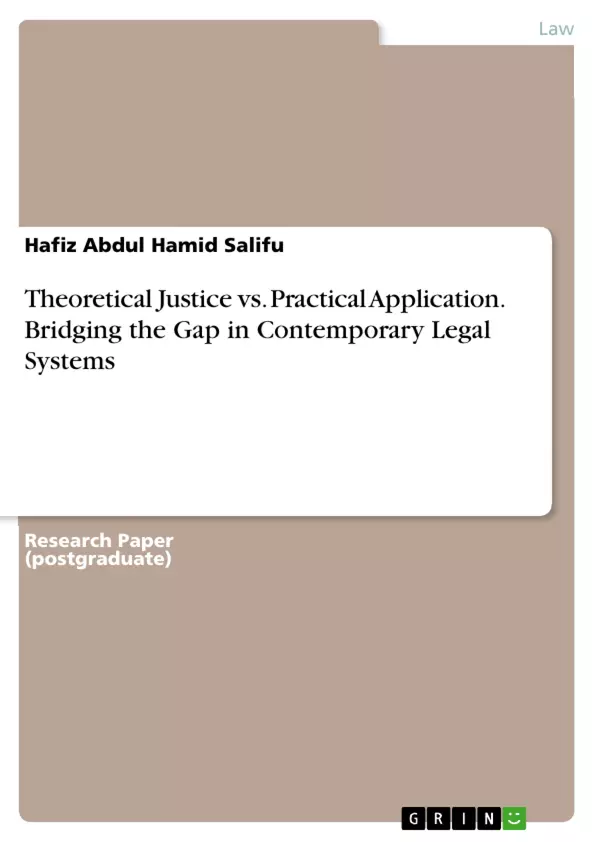This paper explores the dichotomy between theoretical definitions of justice and their practical applications in contemporary legal systems. Theoretical frameworks from renowned philosophers such as Plato, Aristotle, Kant, and Rawls are examined, highlighting their distinct yet converging notions of fairness, equity, and moral righteousness. Despite these comprehensive theories, modern justice systems often fail to uphold these ideals due to systemic biases, disparities in legal outcomes, and political influences. Through case studies such as the Central Park Five and the International Criminal Court's recent controversy involving Israeli Prime Minister Benjamin Netanyahu, the paper illustrates the persistent challenges in achieving true justice. The discussion identifies corruption, discrimination, and limited access to legal resources as significant barriers to justice. Potential reforms, including enhancing transparency, increasing access to legal aid, and promoting procedural fairness, are proposed to bridge the gap between theoretical justice and its real-world application. By understanding both the philosophical foundations and practical challenges, the paper underscores the need for continuous efforts to align legal practices with the ideals of fairness and equity, aiming to create a more just and equitable society.
Inhaltsverzeichnis (Table of Contents)
- Introduction
- Theoretical Definitions of Justice
- Plato's Theory of Justice
- Aristotle's Concept of Justice
- Kantian Justice
- Rawls' Theory of Justice
- Common Themes Across Theories
- Literature Review
- Overview of Existing Literature on Theoretical Justice
- Comparative Analysis of Key Philosophical Theories
- Practical Applications of Justice
- Challenges to Justice in Contemporary Legal Systems
- Wrongful Convictions
- Economic Disparities in Access to Legal Representation
- International Political Influences
- Reforms and Solutions
- Conclusion
Zielsetzung und Themenschwerpunkte (Objectives and Key Themes)
This paper aims to delve into the dichotomy between theoretical conceptions of justice and its practical implementation. It will examine renowned theories of justice by philosophers such as Plato, Aristotle, Kant, and Rawls, identifying both common themes and divergences. Through a thorough review of existing literature, the paper will compare and contrast these theoretical frameworks, highlighting their contributions and limitations.
- Exploring the evolution of justice theories from ancient philosophy to modern thought.
- Identifying key principles and divergences across prominent justice theories.
- Analyzing the gap between theoretical ideals and their practical application in legal systems.
- Examining challenges and limitations in achieving just outcomes within contemporary legal systems.
- Proposing potential reforms and solutions to enhance the effectiveness of justice systems.
Zusammenfassung der Kapitel (Chapter Summaries)
The paper begins by presenting an overview of justice, its significance, and its historical evolution. It then introduces the theoretical definitions of justice from renowned philosophers such as Plato, Aristotle, Kant, and Rawls. Each section analyzes the key principles and concepts of these theories, highlighting their commonalities and differences. The paper also includes a comprehensive literature review, examining existing research on justice theory and comparative analysis of these philosophical frameworks.
Schlüsselwörter (Keywords)
The paper delves into the fundamental concept of justice, exploring its historical development, philosophical underpinnings, and contemporary challenges. It examines various justice theories, including those by Plato, Aristotle, Kant, and Rawls, and their implications for practical application within legal systems. The paper also focuses on issues such as wrongful convictions, economic disparities in access to legal representation, and the influence of international politics on justice. Finally, the paper explores potential reforms and solutions to bridge the gap between theoretical justice and its real-world application, emphasizing the need for continuous efforts to align legal practices with the philosophical ideals of fairness and equity.
- Quote paper
- Hafiz Abdul Hamid Salifu (Author), 2024, Theoretical Justice vs. Practical Application. Bridging the Gap in Contemporary Legal Systems, Munich, GRIN Verlag, https://www.grin.com/document/1478837



